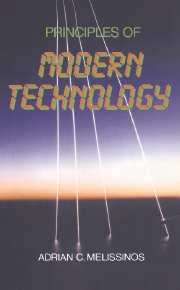Part B - Communications
Published online by Cambridge University Press: 03 December 2009
Summary
Communication implies the transmission of messages and is the basis of human civilization. Speech, smoke signals, or written notes are all forms of communication. We will be concerned principally with communication over large distances, often refered to as telecommunications. Telecommunications are based on the transmission of electromagnetic (em) waves from a sending to a receiving station. The em wave can propagate either in a guided structure such as a pair of conductors, a waveguide or an optical fiber or it can propagate in free space. As technology progressed, higher frequency em waves became available and they offer important advantages as information carriers.
In Chapter 3 we introduce some general principles of information transmission. We examine the analysis of an arbitrary signal into a Fourier series, methods for modulating the carrier, and the sampling theorem for digital encoding of analog signals. The topic of noise in communication channels and of the expected level of random noise is treated next. Finally a brief overview of information theory is given. Information theory assigns a quantitative measure to the information contained in a message and is used to define the capacity of a communication channel.
Chapter 4 is devoted to the problems of the generation, propagation and detection of electromagnetic radiation at different frequencies. The physical laws governing these phenomena are Maxwell's equations and are universally valid. Different frequencies however present different problems in their transmission through the atmosphere and in their propagation along guided structures.
- Type
- Chapter
- Information
- Principles of Modern Technology , pp. 81 - 82Publisher: Cambridge University PressPrint publication year: 1990



